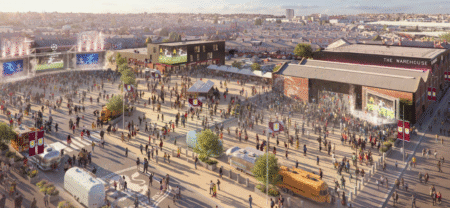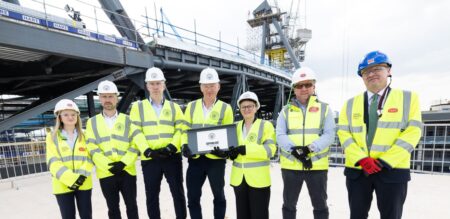Plans from Oak View Group (OVG) for a new arena in Manchester have been published today (Wednesday), marking the latest step in the effort to deliver a facility that would rival the existing Manchester Arena.
The planning submission for the proposed venue has been validated and uploaded to Manchester City Council’s planning portal, with OVG remaining adamant that the English city has the capacity, and demand, to merit a second major arena.
Located on land adjacent to Etihad Stadium, home of Premier League football club Manchester City, the project will be OVG’s first outside its US homeland and the largest privately financed venue in the UK, with £350m (€395.4m/$432.7m) direct investment going into the city.
The maximum capacity of the proposed arena is 23,500, significantly larger than the regular operating capacity of the existing Manchester Arena, which OVG states operated at under 15,000-capacity for 90% of events from 2014 to 2018. However, an early-stage redevelopment vision was last month unveiled for Manchester Arena that would expand its overall capacity to 24,000, making it the largest indoor arena in Europe.
The arena unveiled the vision to mark 25 years since the venue opened. ASM Global, which operates the arena and has been fiercely opposed to the OVG project, provided a first look at the redesign plans, which would see new concourse levels introduced.
In February, OVG confirmed it was bringing forward a planning application, maintaining that Manchester has the capacity for two major venues. US global venue development, advisory and investment company OVG has been working in partnership with City Football Group (CFG), parent company of Manchester City, on the proposed project. In August, OVG confirmed it was working with CFG on the potential development of a new arena on land close to the Etihad Stadium.
Subject to successful planning approval, it is envisaged the venue would take three years to build, with the first events planned to be held in 2023. In October, OVG and CFG completed the first phase of public consultation on the project, which saw initial details behind the plan emerge, such as its proposed location and an early artists’ impression.
News of a possible second major arena for Manchester first emerged in December and the project has since been faced with multiple questions. Manchester City Council in July added the proposed new arena as a future possibility under its development masterplan for the area. In June, the Council hit back at a report on the proposed facility which claimed Manchester cannot sustain two large-scale arenas.
OVG today laid out its vision for the new arena. With a growing market in the UK for live entertainment, including music, family shows, and sport, OVG said analysis undertaken as part of the planning and design process by Ekosgen and PwC shows that Manchester’s economic and cultural strength supports two successful arenas.
OVG said the analysis indicates new arenas drive overall growth in the market, and there are several examples across the UK of two arenas in close proximity operating on a commercially viable basis. It stressed the opening of a new arena has never caused the closing of an existing arena in a single city or overlapping catchment area, and there are various examples of arenas adapting their market positioning and continuing to thrive.
OVG specifically pointed to one of the two arenas in Birmingham, Resorts World Arena, which last month outlined plans to increase its capacity by a further 6,000 to 21,500, adding this demonstrates how successful two arenas in one city can be.
OVG stated the Market Assessment analysis shows a second arena will generate very significant additional economic benefits for the economy with city centre businesses benefiting hugely, where the majority of hotels, serviced accommodation, food, beverage, and retail businesses are based. In the most conservative scenario, OVG said a second arena would lead to a 58% increase in GVA (gross value added) from visitor expenditure compared to the current position, while the most ambitious scenario would result in an 80% increase.
In terms of the location, OVG said an arena at the Etihad Campus site would maximise the latent economic capacity of the Campus, deliver significant community benefits, and further promote this destination as a world-class sporting and leisure destination.
The Etihad Campus was selected due to its suitability, availability, and viability for the proposed arena. OVG said it is an accessible site that is well connected to the centre by non-car modes, with significant sustainable transport connections to the city centre and beyond.
OVG said the location also enables Manchester to attract and retain a wide range of sports, esports and entertainment events, which often require the practice and warm-up space provided by the Campus.
The plans outline that the arena would create 3,350 jobs during construction, and more than 1,000 once open. OVG said it is committed to ensuring as many jobs as possible go to local people and will prioritise hiring people who live within walking distance.
Etihad Campus has its own tram stop, while it is also well connected by bus routes and is around a 30-minute walk from the city centre. Transport studies show that 40% of visitors (or approximately 20,000 people) to the Etihad Stadium on match days currently arrive by non-car modes. OVG said this reflects the maximum capacity of most arena events and therefore “clearly demonstrates” the opportunity afforded by this location for sustainable transport enhancements.
The proposed arena will aim to be the most sustainable UK arena and one of the most sustainable in the world. The plans would build on sustainability initiatives and frameworks already in place at the Etihad Campus.
Tim Leiweke, co-founder and chief executive of Oak View Group, said: “The city has undergone transformational growth in recent years, but without a new state-of-the-art arena it will continue to lose out to other cities on some of the world’s best events.
“Our design brief for the new arena was three-fold. We want to deliver the best in class artist-fan experience for any arena in Europe; to have the flexibility to accommodate multiple event types so Manchester can host a broader range of music, sport and entertainment events; and to aim to build the most sustainable arena in the UK.
“We knew that to be a success, our proposals for a new venue needed to work alongside the existing arena, ensure a demonstrable socio-economic uplift for the city, and support the ongoing regeneration efforts underway in East Manchester. We are pleased that in-depth studies, with industry trends, economic data and growth forecasts all interrogated, indicate that Manchester could support two successful arenas, even under the most conservative growth projections.
“We’re also incredibly grateful for the guidance and feedback from local people and the city’s business community over the last seven months. We are confident the plans we are presenting today are extremely beneficial for the city and will put Manchester on the global entertainment map for decades.”





